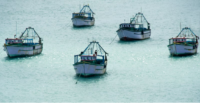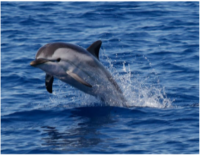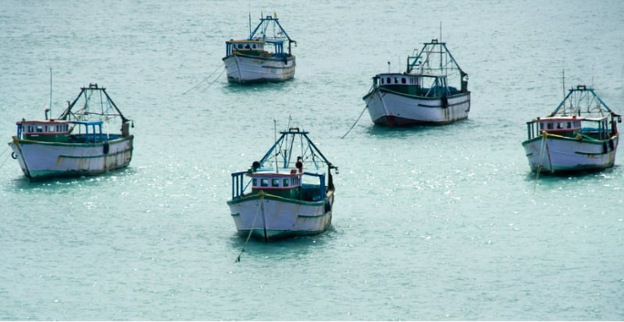
With Global Fishing Fleets, Justice Walks the Plank
By Ilinca Johnson
What happens when poorly regulated fishery harvest practices lead industry to exploit vulnerable, impoverished communities? Global Fishing Fleets (“GFFs”) are large-scale industrial operations sustained by harmful fishery subsidiesprovided by their respective governments. The largest fleets are maintained by China, Japan, South Korea, Russia, and theUnited States. GFF operations keep the cost of seafood low for consumers around the globe by raising numerous other costs that marine ecosystems, the climate, and marginalized communities bear instead. Most alarming is how GFFs promote modern-day slavery. The current state of GFFs calls for great reform to prevent resource exploitation and protect vulnerable communities globally.
Working in the theory of Environmental Justice, scholars “tend to cast a broad net to allow consideration of how exploitative relationships between industrial actors and marginalized communities, including workers, transcend into peoples’ everyday lives.” In this current case, the exploitative practices of GFFs unsustainably harvest from marine ecosystems while simultaneously violating the human rights of vulnerable communities, demonstrating the intersection of environmental and social injustices.
Environmentally, industrial fishing has severely depleted fish stocks. In the past few decades, GFFs have tripled the number of over-harvested stocks of fish through illegal, unreported, or unregulated fishing (IUU). Today, one out of every five fish is caught IUU. Approximately 27 million tons of marine life – including an estimated 300,000 whales and dolphins—are caught and discarded as bycatch each year.


GFFs often illegally harvest in protected areas or the territorial waters of developing nations with weaker regulatory systems. GFFs avoid detection through falsifying reports, deactivating transponders, and transshipments. Transshipments move catch between vessels at sea to large “reefer” ships. These reefers have huge onboard freezers where legal and illegal fish alike mix, hiding their original source. Overfishing threatens the survival of iconic and ecologically important species including the bluefin tuna, cod, and numerous shark species, damaging marine ecosystems and devastating local indigenous communities reliant on subsistence fishing.
GFFs also contribute significant carbon emissions. Since the 1950s, greenhouse gas emissions have more than quadrupled due to unsustainable fishing practices. Today, fleets must expend more energy to maintain catch levels, going further and further from their coastlines in search of enough fish. Now, it takes twice as much effort to harvest the same number of fish as in the 1950s. The loss in fish populations disrupts blue carbon sequestration in the deep ocean, contributing even more carbon dioxide emissions to the atmosphere.
Beyond environmental destruction, GFFs notoriously exploit labor. An estimated one-third of these fleets engage in forced labor, particularly in South Asia, where trafficked workers from Myanmar, Cambodia, Thailand, and Bangladesh then endure inhumane conditions. Many are lured by deceptive job offers, only to have their passports confiscated.
These people then face months to years of twenty-hour workdays without pay while sleeping in a concentration-style bunk room and given largely non-nutritious meals. Supported by reefers and supply ships, a ship crew could be at sea for years. Reports indicate widespread torture, forced confinement, and even the murder of laborers. Between 2019 and 2020, at least 30 Indonesian workers died on Chinese fishing vessels. Today, potentially half a million migrants remain enslaved in Thailand’s shrimp industry. Additionally, Uyghurs and North Koreans are documented as working under forced labor conditions in Chinese seafood processing plants directly supplying global markets.

The exploitation of forced labor is deeply tied to overfishing. Some studies suggest the use of forced labor is a direct response to the diminished populations of fish in the ocean. By aggressively reducing expenditure on crew by utilizing human trafficking, Global Fishing Fleets save money and can provide cheap seafood to the world.
Western consumer markets, particularly in the U.S. and EU, inadvertently fuel these abuses by prioritizing cheap seafood over ethical sourcing. Major retailers such as Walmart, Tesco, and Costco sell shrimp produced through slave labor in Thailand. Currently, it is virtually impossible to trace the opaque supply chains within the global shrimp industry, though efforts are being made. The U.S. alone accounts for 14% of global seafood imports, with an estimated average potential slavery risk of 3.1 kg (~6.8 lb) of seafood per tonne consumed. That risk is 17 times higher than seafood from domestic fishery sources.
To address these injustices, urgent action is needed. Governments and industry leaders must prioritize human rights and environmental sustainability by implementing stronger labor regulations, increasing supply chain transparency, banning harmful subsidies, and ending or closely managing transshipment practices. Closing the high seas to fishing and investing in small-scale, equitable fisheries would help restore fish populations, create more equitable access to highly migratory species like tuna. Most importantly, adopting such measures would protect both the environment and vulnerable communities globally, leading to a more secure future for millions. Without reform, continued overexploitation deepens economic and social inequalities that threaten global food security, the livelihoods of millions, and the long-term health of marine ecosystems.
The time for change is now—ensuring ethical, sustainable fishing practices is essential for both people and the oceans.

